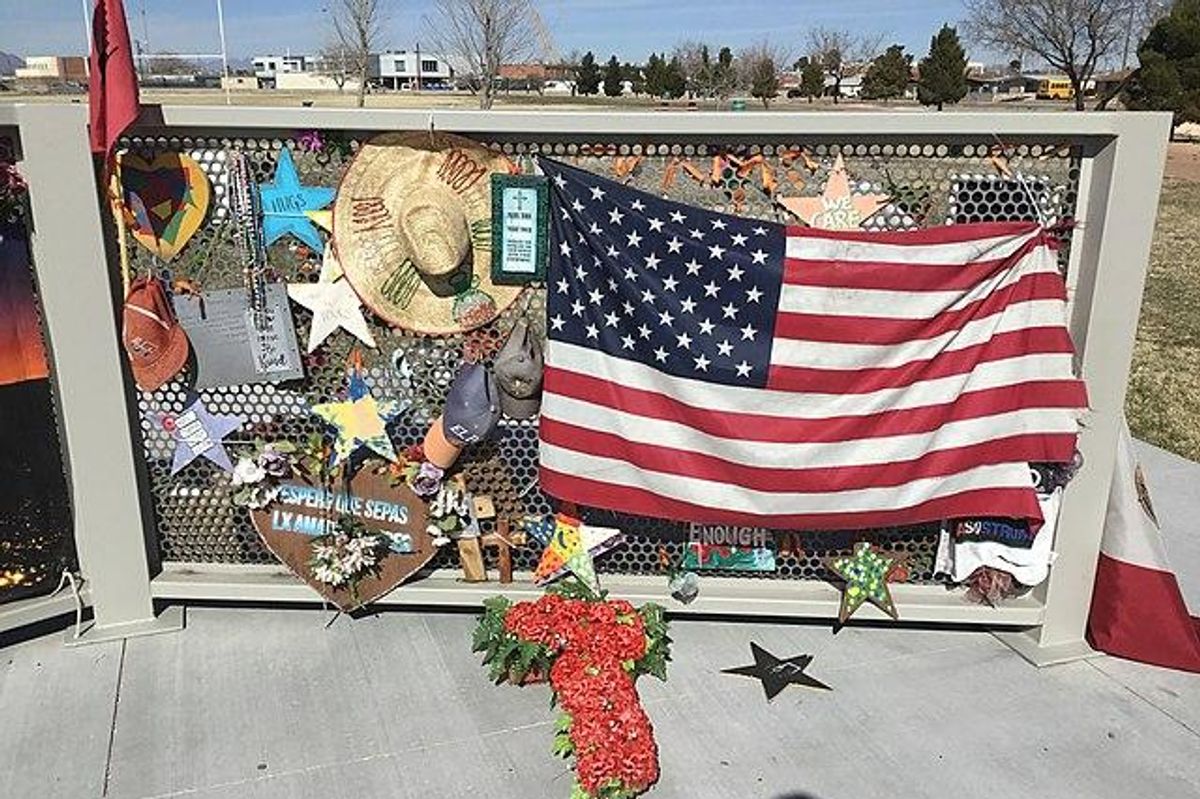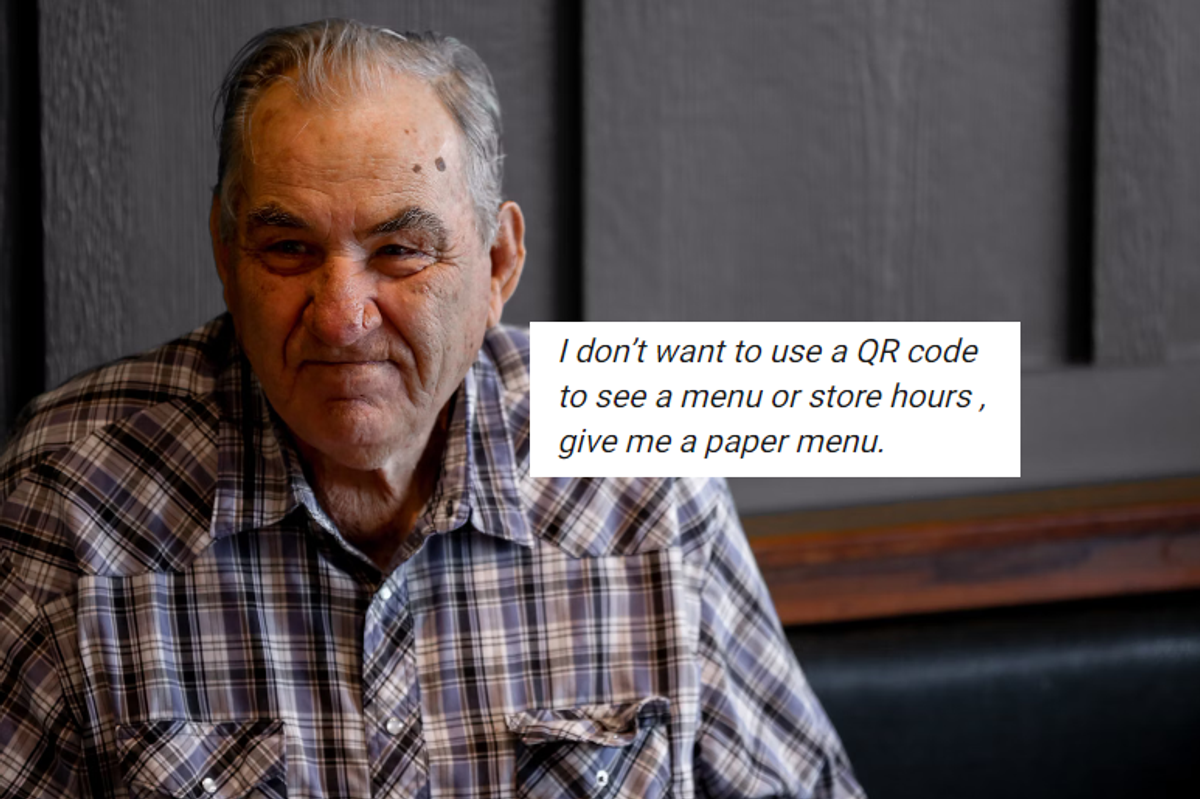More than seven thousand people shared their best ideas to stop mass shootings. Here are the best.
Everyone agrees mass shootings need to end. But what can really be done?

A makeshift memorial after the 2019 El Paso mass shooting.
As of January 24, 2023, at least 69 people have been killed in 39 mass shootings across the United States . The deadliest shooting happened on January 21 in Monterey Park, California, when a 72-year-old man shot 20 people, killing 11. On January 23, a 66-year-old man killed 7 people and injured another in a shooting in Half Moon Bay, California.
It’s hard to see these stories in the news every few weeks—or days—and not get desensitized, especially when lawmakers have made it clear that they will not do anything substantive to curb the availability of assault weapons in the U.S.
After the assault weapons ban, which had been in effect for 10 years, lapsed in 2004, the number of mass shootings tripled.
To find a glimmer of hope in such a dire situation, Reddit user Themissrebecca103 asked the online forum, “What could be done to prevent mass shootings?” and received nearly 16,000 responses. Many of the solutions looked past the intractable gun debate to the root causes that drive people to act out violently.
Here are seven of the most thought-provoking potential solutions to the mass shooting problem.
1. Change attitudes around guns.
"There's no quick answer, in part because 'mass shootings' combine many different underlying issues.
If we are talking about high-profile mass shootings, our problem in the USA relates to several overlapping issues:
It is relatively easy to acquire firearms. The legal mechanisms to deny a high risk person firearms are very limited. Every country produces a small percentage of deeply problematic people; ours is unique in arming them.
American culture around firearms is deeply problematic. Other heavily armed wealthy nations, like the commonly compared Switzerland, make the use of firearms a responsibility of being a good citizen. American culture all too often celebrates firearms as an extra-legal tool for imposing your will.
The modern world is a lonely world. People spend much more time alone now. This gets far beyond the scope of this reply, but many of our traditional social organizations have failed to adapt to the modern world. Young people are increasingly left without a community or direction. This amplifies the above issues.
Combined, these speak to mass shootings as a consequence of low social cohesion on a legal, cultural, and institutional level. Addressing that is multi-generational work." — CxEnsign
2. Take mental health seriously.
"Make therapy more easily accessible for people who are middle or lower class. And actually take mental health and bullying seriously, instead of falsely advocating for it and brushing it off when people need serious mental help." — AshtheArtist

The makeshift memorial outside Star Ballroom Dance Studio in Monterey Park on January 23rd 2023.
3. Do something about red flags.
"People need to have real honest conversations with their loved ones and friends when the red flags go flying. Many of these shootings are not random and the warning signs were present. Help that woman escape her abuser, tell your brother to grow the fuck up and stop being abusive, take your son’s firearms when you know they are an abusive alcoholic, etc… Most of these people don’t live in isolation and people turn a blind eye because they feel it’s not their problem or place to insert themselves. Be brave and speak up. It could save someone’s life." — SometimesILieToo
4. Change the media.
Shut down the news stations and pundits which are drumming up mentally ill people into thinking they're in a fight-for-your-life scenario which justifies mass murder to them?" — ConnieHormoneMonster
5. Foster the development of happy, healthy people.
"Usually in these mass acts of violence, there are signs that people see beforehand. Posts made online, behavior at work or school or at home, basically a known history of struggle. By the time the incidents occur, there's always a person that knew them before, that saw it coming a mile away.
There aren't really resources or protocols for people like this, and removing the weapons from their hands feels like a band aid solution to a much bigger problem.
Happy, healthy people don't go on mass killing sprees, and our current environment isn't exactly producing healthy, happy people. I mean, just look at how many of us are on prescription drugs because we can't cope with the way society is set up. We're on drugs for depression and anxiety and emotional regulation and hormonal regulation because everything is imbalanced. Almost all of us are poor, just a couple of missed paychecks away from being homeless. We're constantly seeking mental stimulation because if we have to think beyond the surface for a minute we start falling apart. We're battling malnutrition without even realizing it because most of us are battling obesity. In other countries the raw fruits and veggies taste better and are more filling, people will travel and lose weight despite eating many of the same kinds of foods, the only difference is the lack of chemicals and preservatives inside.
This society isn't producing happy, healthy people. And some of us can cope with it better than others.
Here, there are three options. You can work 40+ hours a week from the ages of 18 to the day you die and barely make ends meet, you can try an alternative path and end up homeless or close to it, or you can basically win a lottery that either lets you comfortably work less than 40 hours a week, allows you to retire early, or lets you pursue a lucrative passion that doesn't feel like work. Most of us choose the first option.
You can disarm them, but then you've still got creatives that will use their cars or craft an explosive.
Treatment is probably the second best option we have. Ideally, we would know someone that sets off alarm bells, and we could call a doctor for them. They'd spend a few months getting help, and come back better.
But that isn't how it's set up. There aren't resources for this. You can't force people to get therapy. You can't just call the cops on people that haven't committed a crime, because you think one day they might commit a crime.
And it sucks, because we all know the signs. Sometimes we try to call someone for help, and there just isn't a department for that.
The best option would be to create a better environment for everyone, encourage community and friendships and strengthen the bond between people to promote love and harmony, fix the food situation, fix the income situation, promote better and more diverse ways of living. Because if you don't feel depressed and angry and alone, you won't be at risk of falling into the mindset of someone who does these sorts of things.
America's gun violence is a symptom of a much larger problem, and the ones who want to fix that problem don't have the means to do so. The ones who have the means to fix it either don't know why it's happening, or don't care why it's happening.
Until we stop offering bandaid solutions that would be ineffective or minimally effective, we will continue to see this kind of behavior." — SourBlue1992

President Barack Obama delivers a statement in the James S. Brady Press Briefing Room of the White House regarding the mass shooting at Sandy Hook Elementary School in Newtown, Connecticut, Dec. 14, 2012.
6. It starts at home.
"As a teacher, it starts with kids needing love and care at home, which leads to people having their basic Maslow needs met so they aren’t constantly struggling. And mental health needs to become a priority instead of something we mostly ignore in the US. Kids (and adults) seek power and a sense of control through a gun because it’s missing in the rest of their life." — Amherst 2023
7. Stop turning shooters into celebrities in the media.
I'm British. I don't know what's best for Americans as well as they do. But here's some thoughts:
I don't think you can copy-paste UK policy to the US. it's like changing someone's intrinsic identity. Take Iran for example. One of the lowest alcohol mortality rates. Imagine an Iranian saying to a British person 'why don't you just ban alcohol! It causes so much death. We banned it and our rate of mortality due to alcohol is one of the lowest in the world.'
You'd say something like "why should I give up something I enjoy and is part of my culture because a few bad apples take it too far?"
From talking to them, Americans view guns the same way. 'Why does someone else doing wrong with guns have any bearing on me who's just using it for fun/protection?'
I'd say a mix is gun regulations and mental health support and not making martyrs of shooters has the best chance." — allthetaimpdetime
Some responses have been edited for length.
- A 1996 school massacre led the UK to gun reform. They haven't had a school shooting since. ›
- 80 percent of Americans support common-sense gun control. Stop making excuses and get it done. ›
- Comedian perfectly nails how little 'thoughts and prayers' mean after a mass shooting ›
- School shooting thwarted after a brave high schooler left a tip on Sandy Hook hotline - Upworthy ›







 A woman is getting angry at her coworker.via
A woman is getting angry at her coworker.via  A man with tape over his mouth.via
A man with tape over his mouth.via  A husband is angry with his wife. via
A husband is angry with his wife. via 
 Some Boomer grandparents are being called out for "gramnesia".
Some Boomer grandparents are being called out for "gramnesia".

 A woman gets a tattoo.
A woman gets a tattoo. Boy playing on the computer.
Boy playing on the computer.
 Grumpy boomers aren't wrong about everything. Photo by
Grumpy boomers aren't wrong about everything. Photo by  Even the young people can't stand QR codes. Photo by
Even the young people can't stand QR codes. Photo by  Everything, even fast food, has gotten out of control expensive. Photo by
Everything, even fast food, has gotten out of control expensive. Photo by